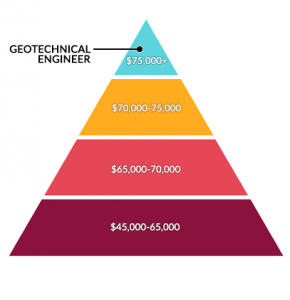The 5-Minute Rule for Geotheta
The 5-Minute Rule for Geotheta
Blog Article
The Ultimate Guide To Geotheta
Table of ContentsThe Ultimate Guide To GeothetaSee This Report on GeothetaThe Single Strategy To Use For GeothetaThe Greatest Guide To Geotheta4 Easy Facts About Geotheta Explained

They conduct website investigations, gather examples, execute laboratory tests, and examine information to assess the suitability of the ground for building and construction projects - Engineer of Record. Based on their findings, geotechnical designers provide recommendations for foundation style, incline security, retaining structures, and mitigation of geotechnical risks. They collaborate with various other professionals, such as architects, structural engineers, and construction teams, to guarantee that geotechnical considerations are integrated into the overall project style and application
By examining the habits and residential properties of dirt and rock, they can recognize possible geotechnical dangers such as landslides, dirt settlement, or slope instability. Their competence assists avoid failures or accidents that could endanger lives and home. Right here are some comprehensive responsibilities and responsibilities of a geotechnical designer: Site Investigation: Geotechnical engineers conduct website examinations to gather information on subsurface problems.
They translate the information to recognize the residential or commercial properties and behavior of the soil and rock, including their strength, permeability, compaction qualities, and groundwater conditions. Geotechnical Analysis and Design: Geotechnical engineers analyze the information collected during website examinations to analyze the security and viability of the website for building and construction jobs. They do geotechnical computations and modeling to examine elements such as bearing capacity, settlement, incline security, lateral earth pressures, and groundwater circulation.
Facts About Geotheta Uncovered
Foundation Layout: Geotechnical designers play an important role in designing structures that can securely support the intended framework. They evaluate the soil conditions and load demands to figure out the suitable structure type, such as superficial structures (e.g., grounds), deep foundations (e.g (https://my-store-fc66c1.creator-spring.com/)., heaps), or specialized strategies like dirt enhancement. They think about elements such as negotiation limits, bearing ability, and soil-structure communication to establish optimal foundation layouts
They examine building plans, display site activities, and perform field evaluations to verify that the layout referrals are complied with. If unexpected geotechnical issues emerge, they examine the situation and give referrals for removal or changes to the style. Risk Analysis and Mitigation: Geotechnical engineers assess geotechnical threats and risks related to the job website, such as landslides, liquefaction, or dirt erosion.

Collaboration and Communication: Geotechnical engineers work very closely with other professionals associated with a job, such as engineers, structural designers, and construction groups. Effective communication and collaboration are vital to integrate geotechnical considerations right into the general project style and building and construction process. Geotechnical designers offer technological expertise, answer inquiries, and make sure that geotechnical demands are met.
Excitement About Geotheta
Here are some kinds of geotechnical engineers: Structure Designer: Structure engineers focus on designing and analyzing foundations for frameworks. They assess the soil conditions, lots requirements, and site qualities to establish one of the most suitable foundation kind and layout, such as shallow structures, deep foundations, or specialized methods like heap structures.
They examine the elements influencing incline security, such as soil residential properties, groundwater conditions, and incline geometry, and create approaches to stop slope failings and alleviate threats. Quake Designer: Earthquake engineers focus on evaluating and creating structures to stand up to seismic pressures. They examine the seismic danger of a website, evaluate dirt liquefaction capacity, and create seismic layout standards to guarantee the security and resilience of frameworks throughout quakes.
They perform field screening, gather examples, and analyze the gathered data to identify the soil residential or commercial properties, geologic formations, and groundwater conditions at a site. Geotechnical Instrumentation Engineer: Geotechnical instrumentation engineers concentrate on surveillance and gauging the actions of dirt, rock, and structures. They set up and keep instrumentation systems that monitor variables such as dirt negotiation, groundwater degrees, slope activities, and architectural displacements to examine performance and offer early warnings of potential concerns.
Getting My Geotheta To Work
They conduct examinations such as triaxial tests, loan consolidation tests, straight shear examinations, and permeability examinations to gather information for geotechnical evaluation and style. Geosynthetics Designer: Geosynthetics designers concentrate on the layout and application of geosynthetic products, such as geotextiles, geogrids, and geomembranes. They make use of these materials to enhance dirt security, enhance inclines, provide drainage options, and control disintegration.
They tend to be investigatory individuals, which indicates they're intellectual, reflective, and analytical. They wonder, systematic, sensible, analytical, and rational. Some of them are likewise social, indicating they're kind, charitable, participating, patient, caring, useful, compassionate, tactful, and pleasant. Does this seem like you? Take our complimentary occupation examination to discover out if geotechnical engineer is just one of your top occupation matches.
In the office setting, geotechnical engineers use specialized software program tools to perform estimations, produce designs, and analyze information. They prepare reports, testimonial project specifications, connect with customers and team members, and coordinate job activities. The office setting gives a helpful atmosphere for research study, evaluation, and cooperation with various other specialists entailed in the job.
Our Geotheta Ideas
They regularly visit job sites to carry out site examinations, analyze geotechnical problems, and gather information for analysis. These brows through include traveling to various places, occasionally in remote or tough terrains. Geotechnical engineers may execute dirt sampling, conduct tests, this article and display building and construction tasks to make certain that the geotechnical aspects of the project are being executed properly.
Geotechnical engineers additionally function in specialized geotechnical labs. Geotechnical laboratory designers work extensively in these atmospheres, taking care of screening devices, operating instruments, and tape-recording data.
Report this page